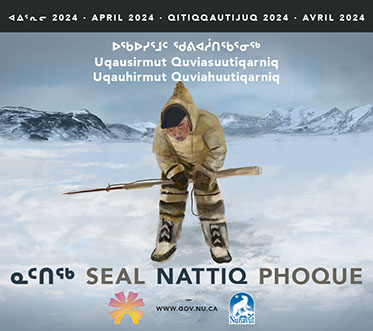Opingivik hunting grounds can support a community
“People have to look at how Inuit can be on their own feet today”
SARA MINOGUE
Lypa Pitsiulak has made his home at Opingivik outpost camp in Cumberland Sound for the last 25 years. Now, he says that the camp would make an excellent location for a new community that is close to the land, and the hunting grounds where he grew up as a child.
“People always liked this camp,” Pitsiulak said, speaking from Opingivik on a satellite phone last week.
“Now people are asking why it wasn’t developed and didn’t anybody know anything about this land when they were looking for a land to settle back then?”
Nunavut will not thrive if people are told where to live, Pitsiulak said. Instead, people should ask questions like: “Is there a good place to keep your boat anchored? Is it a good place for anything?”
“Long ago when Panniqtuuq was being developed, those kinds of questions were never asked.”
At Opingivik, the land is vast and wildlife is abundant, Pitsiulak said. It’s a good fishing area and there are caribou close by, like Iqaluit.
The beach is smooth, with a good place to anchor boats. Unlike Panniqtuuq, there is plenty of room for the community to grow.
“There’s huge land that can be used to build houses and a landing strip,” Pitsiulak said. “You can even imagine that jets will be able to land in the next generations to come.”
Opingivik, or “the spring place,” has long been a popular hunting spot for the people of Panniqtuuq, and countless generations before them. Several people have cabins in the area.
Pitsiulak, now 61, moved permanently to the camp with his wife Annie in the late 1970s. He was the only one of five siblings to grow old enough to have children, one of whom he delivered himself at Opingivik. He now has 16 children and grandchildren living with him at the camp.
In a documentary called Lypa produced by the National Film Board in 1988, Pitsiulak explained why he left Panniqtuuq.
“In the future, there will be a need for people who know the land. I feel strongly that my children grow up knowing what life is like out here… People who know the land are respected and will be the leaders.”
Last week he explained how he came to make that decision.
“I moved from [Panniqtuuq] not because I dislike the place, but knowing that I can survive, and that I wouldn’t lead a thriving life if I lived there.
“I was thinking I wouldn’t do much with my measly income with the arts and crafts centre, where I worked. Looking at all the reasons, I thought I wouldn’t be able to survive. Also, looking at how I should try to survive, I thought I could do it and I’ve used that as a goal, so I’ve returned to the camp near the place I used to live.”
Pitsiulak still returns to Panniqtuuq regularly, and considers it a part of his home as well, but always returns to Opingivik.
“People have to look at how Inuit can be on their own feet today and not just recipients of welfare. I think I can live where there’s no qallunaat and even if I don’t go get supplies all year long and live in qarmaq [sod house], I still think I can survive.
It is up to the Inuit to preserve their lifestyle, Pitsiulak said, even if that means getting help or supplies from other communities. For Pitsiulak, it also means helping others in return, as he does whenever there is a need for a search and rescue in the area.
Over 100 people from Panniqtuuq, and some from Iqaluit, have signed a list of people interested in moving to Opingivik. People will remain in Panniqtuuq, Pitsiulak says, but it is getting crowded, and “people don’t need to live in crowded places.”
The alternative is to go back to a more traditional lifestyle.
“I’m not the only who started this, it has started with the aboriginal people, it’s been a camp for a very long time and now I’m living in it,” Pitsiulak said.
The idea for a new hamlet has been presented to several organizations, with no formal response so far.
“People are anxious to get started on Opingivik. They even ask when it will start, are we getting Opingivik. I wish it could become a community before I die.
“It’s not for me. I am thinking of our next generation.”
Translation by Itee Akavak.





(0) Comments